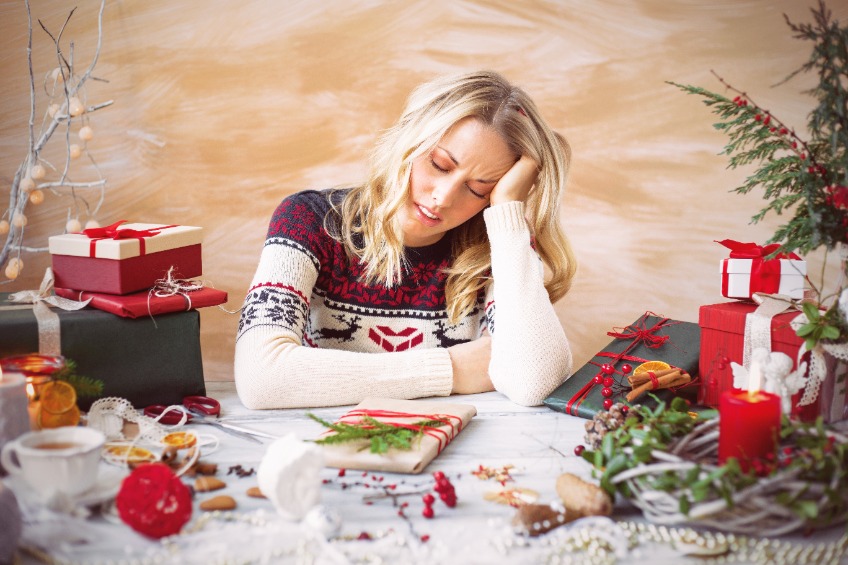“66% of respondents reported that they feel more stressed out during the holiday season.”
– Sleepoplis.com
“A 2018 study found that 88% of Americans felt stressed while celebrating the holidays.”
– Perrigo, via PR Newswire
It’s the most wonderful time of the year … but also the most stressful for many of us. And when we are stressed, we may struggle to fall asleep or stay asleep, which turns into a dangerous cycle, because the more sleep-deprived we become, the less we can handle or tolerate stressful situations.
“High levels of stress impair sleep by prolonging how long it takes to fall asleep and fragmenting sleep. Sleep loss triggers our body’s stress response system, leading to an elevation in stress hormones, namely cortisol, which further disrupts sleep. Research has shown that sleep plays an important role in learning and memory. Chronic sleep deprivation also has been associated with decreased metabolism and endocrine dysfunction.”
– Dr. Anise Wilson, Baylor Medical College
Nearly half of Americans report experiencing Transient, Intermittent or Chronic insomnia at some point in their lives, regardless of gender or age. So what is the different between Transient, Intermittent and Chronic Insomnia?
- Transient insomnia is defined as lasting for a few nights
- Intermittent insomnia is periodic episodes of insomnia
- Chronic insomnia occurs on most nights and lasts a month or more
On average, adults need anywhere from seven to nine hours of sleep per night to feel rested and resilient enough to take on the next day. And this quantity and quality of sleep become ever more essential during the holidays as we endure different stressors: financial concerns, family conflicts, travel plans, food and meal preparation, gift giving anxieties, and the stress of shopping, finding and wrapping those gifts for your loved ones. So in this blog, we’ll discuss factors of the holiday season, how they can affect your sleep; as well as how you modify and regulate those factors so you can begin enjoying the holiday season.
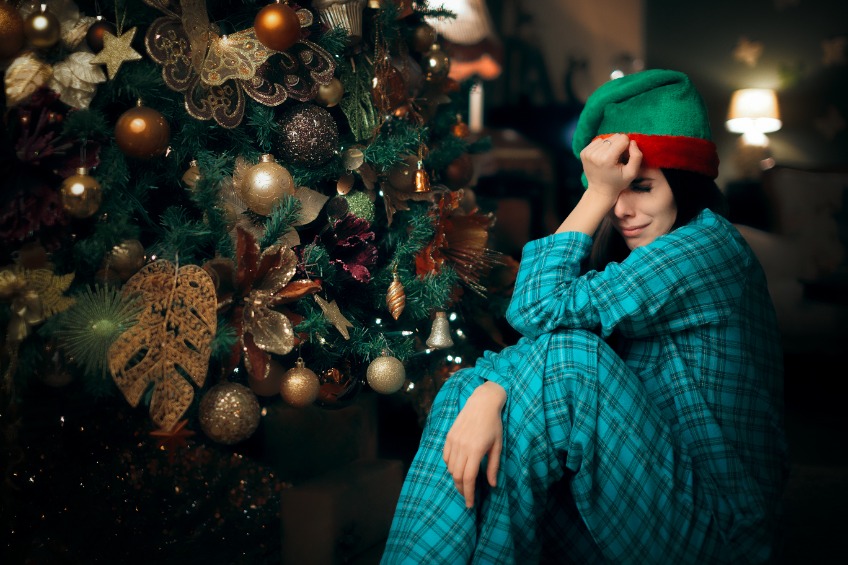
“I feel stress trying to plan for the holidays, when it comes to gift-giving, cooking, dealing with family dynamics and just making everything picture perfect for Christmas.”
“The American Psychological Association found that on average, more women than men report feeling stressed around the holidays.”
– APA.org
Studies show most of those stress about holiday preparations are experienced by the women of the families. Studies show that more women than men shoulder the responsibility of holiday shopping and planning, and report stress from the limited time available to get everything done; and those with kids start stressing as early as the beginning of November.
“Some of the most commonly felt negative emotions during the holidays include fatigue, stress, irritability, and sadness.”
– American Psychological Association
So here are tips to stay calm in the midst of holiday chaos:
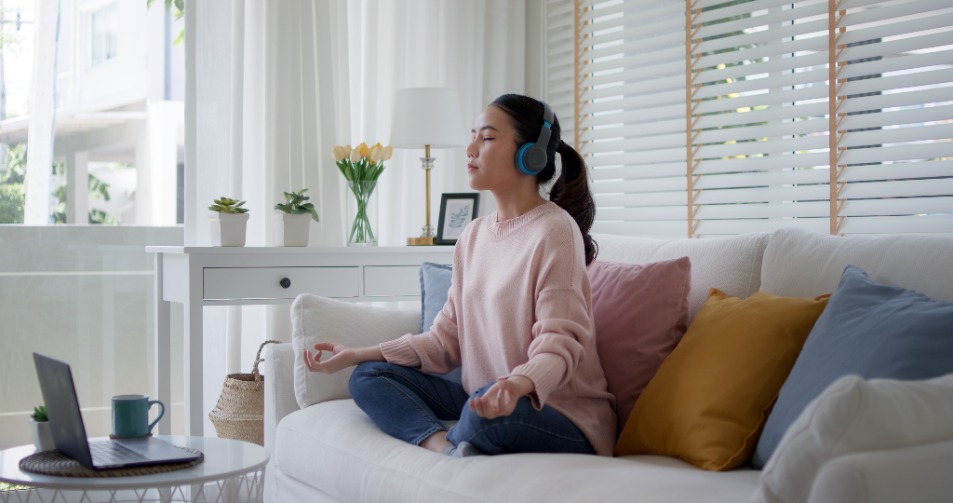
- Take a walk: While it seems like you have a million items on your to-do list, sometimes the most productive thing you can do is just stepping out for a walk. Try to focus on your environment rather that the stressor. Just a few minutes alone out in nature regardless of the weather can put your situation into perspective.
- Utilize proven calming techniques: There are a plethora of options out there from guided relaxation, active relaxation, visualization, breathing exercises, calming sounds and music. There are numerous books, videos (many free on YouTube), and smartphone apps, here are some popular apps and videos:
- Calm.com: They are the #1 app for Sleep, Meditation and Relaxation, with over 100 million downloads and over 1.5M+ 5-star reviews. They also offer Daily Calm 10 Minute Mindfulness meditations on Youtube (https://www.youtube.com/@calm).
- Breathwrk.com: The Breathwrk app takes the science of breathing exercises even further by curating a collection of breathing exercises based on your goal: falling asleep, feeling relaxed, feeling energized, or alleviating stress.
- Mindshift CBT App: MindShift CBT is an app that supports users of CBT by providing daily mood check-ins, guided relaxation and mindfulness meditations, and tips for dealing with general worry, social anxiety, phobias, panic attacks, and more, all for free. (https://www.anxietycanada.com/)
- 10 Minute Guided Meditation by Boho Beautiful: This 10-minute mindful meditation will give you the mental clarity and space necessary to ground yourself with beautiful focus and set your day on the perfect track for success and fulfillment. (https://www.youtube.com/watch?v=uTN29kj7e-w)
- 5 Minute Meditation You Can Do Anywhere by Goodful: In just 5 minutes you can reset your day in a positive way. (https://www.youtube.com/watch?v=inpok4MKVLM
- 10 Breathing Techniques for Stress Relief by Healthline.com: Breathing exercises don’t have to take a lot of time out of your day. It’s just about setting aside time to pay attention to your breathing. (https://www.healthline.com/health/breathing-exercise)
- Get Regular Exercise: Physical activity can affect the nervous system to reduce stress, even if just for 30 minutes a day. Yoga and tai chi combine exercise and relaxation for a healthier and stress-resistant mind and body.
- Be Good to Yourself: Eat healthy, rest when tired, read a good book or watch a movie to help you escape even for a short while. Being immersed in your favorite, pleasurable activities can dispel anxiety even for a short time.
- Make a List and Check it Twice: When worry begins to dominate your thoughts and your sleep, write down nagging thoughts and tasks, so you won’t forget it but you can put it aside for now. Keeping a notebook or journal near your bed to write down your worries or things you want to accomplish can help clear your mind so your body and mind can rest and fall asleep.
- Talk about it: Whether your partner, friends, family or even a professional, find an outlet that you can express yourself in a safe, trusted space to get perspective and also get help if needed.
These are a few of numerous strategies to help relieve nighttime stress and anxiety before bed, as well as improve the quality of your sleep. Try various relaxation techniques or a combination of them until you find the right one for you. If your insomnia becomes more frequent or even chronic, you should consult your physician to help determine what the best approach is for you.
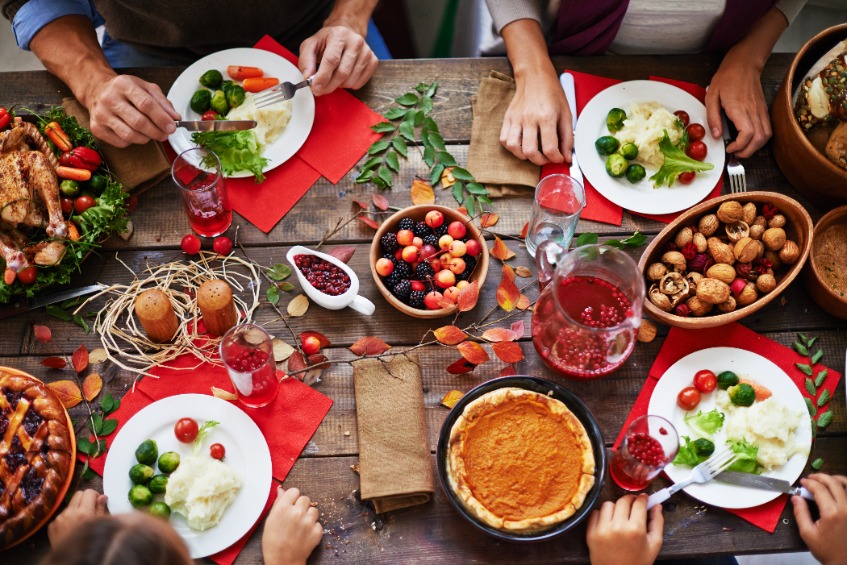
“During the holidays, I tend to overeat and eat the wrong foods at the wrong time.”
The holidays are often defined by a big breakfast Christmas morning, the all-day snacking and then the Christmas family dinner with all the fixings. From high carbohydrate snacks, high sugar desserts, candied yams, green bean casserole, stuffing, cranberry sauce, turkey and gravy, honey roasted ham, mashed potatoes, dinner rolls … well ‘tis the season for fat-laden comfort food, chocolate-covered sweets and other belly-bulging temptations that can be not-so-jolly for our weight loss resolutions.
All these goodies start another precarious cycle.… What you eat and drink can affect how well you sleep and how well you sleep affects what you choose to eat and drink. When you are tired, you are more likely to eat more than you need to and make poor food choices, which can lead to weight gain and poor quality sleep. So here are some modifications you can make during the holidays without missing out on your holiday goodies:
- Monitor the amount of highly processed carbohydrates, sugary foods and drinks, caffeinated beverages and spicy foods you eat through the day but especially before bedtime.
- Experts recommend waiting at least three hours after you’ve eaten to go to bed. This allows your body time to digest your food so you’re not up at night with an upset stomach, indigestion, or acid reflux.
- In the evenings, at least 3 hours before you go to bed, you can enjoy foods such as almonds, almondmilk, walnuts, turkey, chamomile or passionflower tea, kiwi, tart cherry juice, bananas, oatmeal and organic dairy products.

“During the holiday, I enjoy the occasional holiday cocktail or spiked eggnog to help me relax and sleep.”
While we all enjoy the holiday cocktails and specialty drinks, alcoholic beverages can actually impair the quality of your sleep, not improve it.
“Regular drinking can affect the quality of your sleep making you feel tired and sluggish. This is because drinking disrupts your sleep cycle. Some people may find alcohol helps them get to sleep initially, but this is outweighed by the negative effect on sleep quality through the night.”
– Drinkaware.co.uk
While drinking high levels of alcohol can make you fall into a deep sleep, the effects are short-lived as the alcohol levels drop, kicking your brain into overdrive and fragmenting your sleep patterns. Why?
“In the brain, alcohol acts on gamma-aminobutyric acid, or GABA, a neurotransmitter that inhibits impulses between nerve cells and has a calming effect. Alcohol can also suppress rapid eye movement, or REM sleep, which is when most dreaming occurs. You’ll also probably have more vivid or stressful dreams and — because fitful sleep means that you’re waking up more regularly — you are more likely to remember them.”
– NY Times
If you have already been diagnosed with sleep apnea, alcohol may only exacerbate your symptoms and causing more apnea events (when breathing stops and starts). Some studies have suggested that alcohol contributes to sleep apnea because it causes the throat muscles to relax, which in turn creates more resistance during breathing. If you’re using an AutoPAP* machine, the increase of apnea events will set your pressure settings at higher levels, depending on the range your sleep physician has set. This may take some adjustment and initial discomfort to get acclimated to the higher-pressure settings.
Here are some ways to moderate your alcohol consumption during the holidays:
- Drink half. Reduce the amount you drink by half, for example, half the glass, half the shot, half the glass of wine, half the mug of spiked coffee or eggnog. Be mindful of consumption and set a limit before you start the day or evening.
- Use Less Sugar. Opt for cocktails or types of spirits that have fewer calories and no added sugar. Do you best to avoid mixed drinks and stay hydrated with water in between drinks.
- Know your Priorities. Your health, your safety and your ability to make good decisions are all at risk when you overindulge on alcohol. So make a plan, go with a friend or partner, and stop drinking before your inhibitions are impaired.
- Stop Drinking before bed. It’s recommended to stop drinking water two hours before bed, but it’s recommended to stop drinking alcohol at least three hours before bed.
Please note: If you feel that you sometimes drink too much alcohol, or your drinking is causing problems, or if your family is concerned about your drinking, talk with your health care provider.
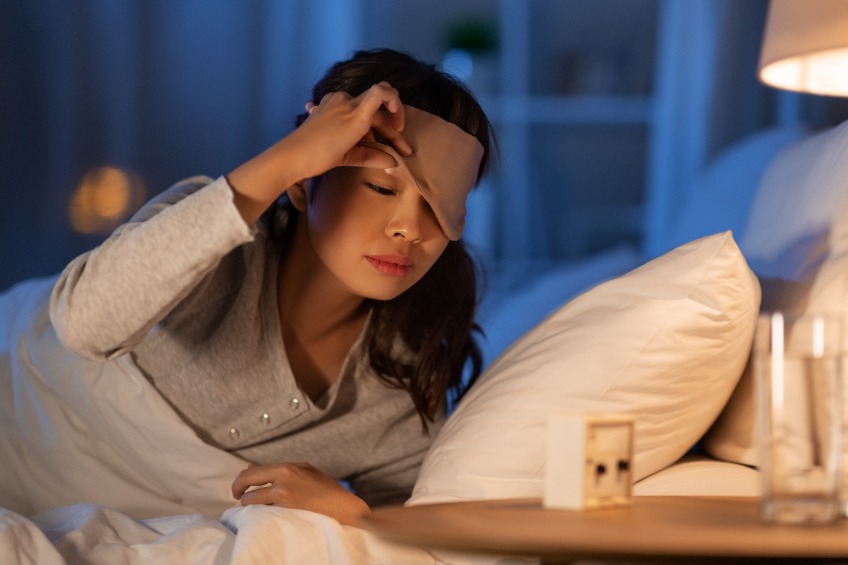
“I have trouble sleeping when traveling and staying with friends or family during the holidays.”
“We found that a majority of people (68%) sleep away from home during the holidays. Of this group, the most sleep in hotels (22%), followed by a friend’s home (21%), and lastly 20% sleep at their parents’ home.”
– Sleepopolis.com
Whether traveling either an hour away or several times zones away, staying with family or friends can cause anxiety and stress as we are not in our normal environment. The changes in ambient temperature, bedding, noises, lighting, even smells can keep our minds and body on alert as we take time to adjust to our new setting.
“Experts agree the first night of sleep is typically the worst. They call it First-Night Effect, where one half of our brain stays awake to protect us from potential threats; hence why every random noise seems to jolt you awake at the start of your vacation.”
– Cooking Light.com
Whether the first night or the last night on your travels, here are some ways to improve sleep while traveling:
- Plan Ahead. If staying at a hotel or at someone’s home, ask what type of bed, pillow and bedding they have, so you can prepare and bring what is needed to add to your comfort. Bring your own sleep kit with you to make you feel at home, including your comfiest pajamas, your own pillow and pillowcase, a soothing scent or aromatherapy.
- Lights out. Turn off all the lights and close the curtains to block out as much light as possible to ensure your circadian rhythm stays intact.
- Cool Down. If you can access the thermometer controls, turn down the heat or crank the air condition during the night. It’s best to sleep when temperatures are in the 65 to 70 degree range. Also pack lightweight sleep clothes and portable fans to prevent becoming overheated.
- Sssshh! Use a white-noise app (White Noise Lite or Noisli) to drown out unfamiliar noises or traffic sounds or bring ear plugs, just in case.
If traveling further to a family’s home or a holiday vacation, jet lag is a common complaint. What is jet lag? Jet lag, also called jet lag disorder, is a temporary sleep problem that can affect anyone who quickly travels across several time zones. The more time zones you cross, the more likely you are to feel jet lag.
“For example, if you leave New York on a flight at 4 p.m. on Tuesday and arrive in Paris at 7 a.m. Wednesday, your internal clock still thinks it’s 1 a.m. That means you’re ready for bed just as Parisians are waking up. It takes a few days for your body to adjust. In the meantime, your sleep-wake cycle and other body functions such as hunger and bowel habits remain out of step with the rest of Paris.”
– MayoClinic.org
Jet lag can cause daytime fatigue, loss of focus and concentration, stomach and digestion issues, and a general feeling of being unwell. To help reduce symptoms of jet lag, get plenty of rest before your trip, arrive early so you can acclimate to the new time zone before holiday festivities begin, and prepare ahead for the time change the week before your travel. How?
- East – Bed Earlier. If you’re flying east, your internal clock will be adjusted backwards, so try going to bed one hour earlier each night for a few days before your trip.
- West – Bed Later. If you’re flying west, your internal clock will be adjusted forwards, so go to bed one hour later for several nights before you fly.
- Eat when they Eat. Also adjust the time of eating your evening meals closer to the time you’ll be eating them during your trip.
- Stay hydrated. Drink plenty of water before, during and after your travel as dehydration can worsen jet lag symptoms. Also limit your consumption of alcohol and caffeine until fully adjusted to your new time zone.
“I don’t know what to buy my loved ones for the holidays!”
Here are some great gift ideas for the CPAP user or those in your life with undiagnosed Sleep Apnea:
GREAT GIFT IDEA OF THE CPAP USER OR UNDIAGNOSED OSA SLEEPER: Everything CPAP Gift Card
Give the gift of a better night’s sleep! We have a full inventory of mask supplies, CPAP batteries, travel devices, accessories, filters, cushions and even aromatherapy. Check out online store today or call us for a gift certificate!
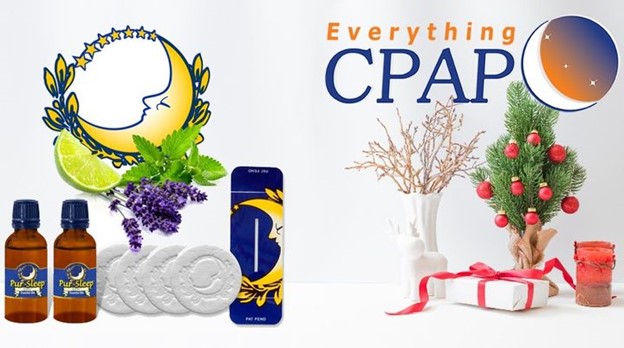
GREAT GIFT IDEA FOR ANYONE WHO NEEDS TO RELAX, UNWIND AND IMPROVE SLEEP: Pur-Sleep CPAP Aromatherapy
Pur-Sleep provides simple and fast CPAP desensitization. Frustrated with CPAP? Can’t tolerate your mask? Pur-Sleep can help you get used to your CPAP so you can get some sleep. Our Basic Starter Pack contains everything you need to experience the Pur-Sleep CPAP Adjustment System
Product Features:
- Universally Compatible with All CPAP/BiPAP Machines
- Natural, Holistic Essential Oils for True Aromatherapy
- Simple & Convenient Application
- Specially Designed, Reusable Diffuser Wafer Pads
- Wide selection of Natural and “AirCandy” Fragrances Available
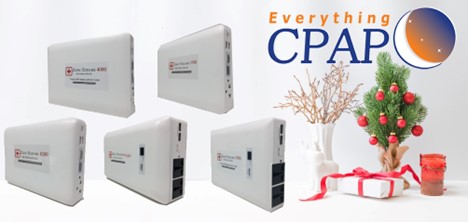
GIFT IDEA FOR THE CPAP USER WHO LOVES TO TRAVEL: Zopec Travel CPAP Batteries
The Zopec Travel CPAP Batteries are the most reliable and dependable CPAP batteries on the market, with great pricing. Designed for medical device backup power. Perfect for traveling, camping or backup power.
- · Zopec Explore 8200 Travel CPAP Battery (288 Wh)
- · Zopec Explore Oxygen Backup CPAP Battery (576 Wh)
- · Zopec Explore 5500 Travel CPAP Battery (160 Wh)
- · Zopec Explore 4000 Travel CPAP Battery (130 Wh)
- · Zopec Explore 5700 Travel CPAP Battery (160 Wh)

GIFT IDEA FOR THE CPAP USER WHO LIKES TO TRAVEL OFF THE BEATEN PATH: Zopec EXPLORE 40Lite Solar Charger
This is the Solar Panel Charger for all Zopec Explore Batteries. It’s Super Thin, Compact and Light: Dimension (folded up) 9″ x 9″ x 3″ and (expanded out) 32″ x 16″ x 0.25″. Weight is only 3.0 lb. This 40 Watts portable solar panel charger is made up of Mono-crystalline solar cells, which give you one of the most efficiency per surface area. Highest Quality and Reliability. Most advanced portable solar charger for batteries. Comes with DC charge extension cord and a traveling case.
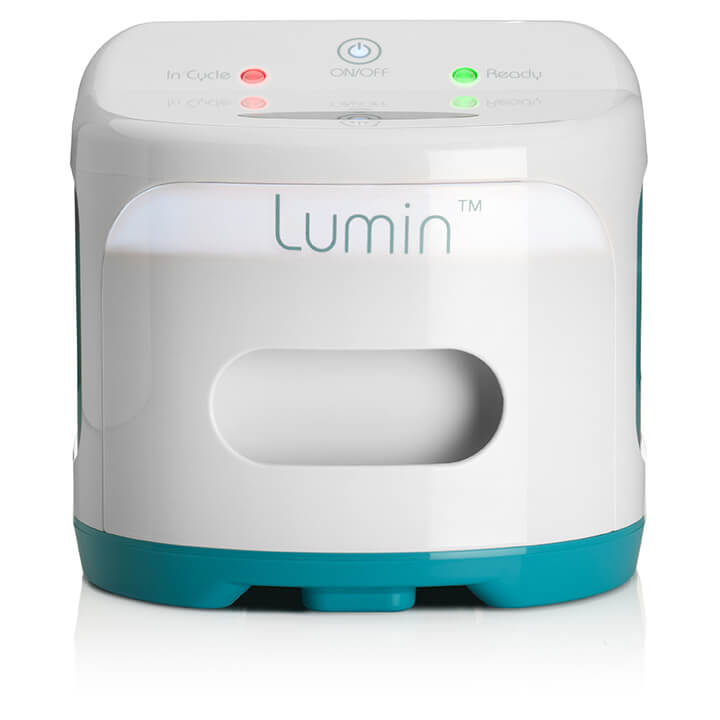
GREAT HOLIDAY GIFT IDEA FOR the CPAP USER: 3B Medical Lumin CPAP Cleaners
Lumin Bullet uses advanced technology to clean your hose from the inside out. Chemical, gas and heat free cleaning technology to improve CPAP hygiene. Ultraviolet radiation has long been used in medical applications to kill biological microorganisms, such as viruses and bacteria. The Lumin Bullet contains a LED that produces light in the ultraviolet spectrum.
FEATURES:
- Fast 60 second cleaning cycle
- Micro USB recharging
- Slim Portable design
- Built in Safety Relays

GREAT IDEAS FOR STOCKING STUFFERS: Shop Everything CPAP Online store!
Looking for last-minute stocking stuffers that can be put to good use (and that are very affordable)? We have CPAP accessories including batteries, cushions, filters, comfort accessories, chinstraps, tubing, and tube wrapping, wipes, cleaning supplies, CPAP pillow, travel DC converter, aromatherapy and more …


